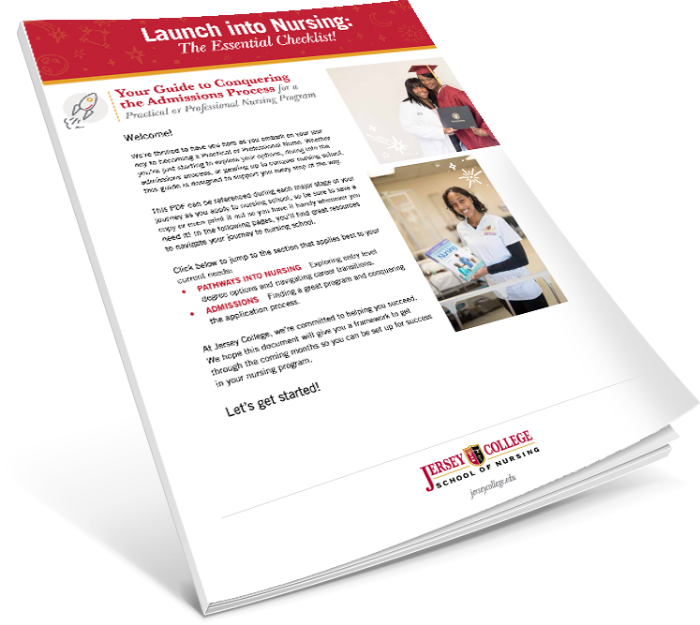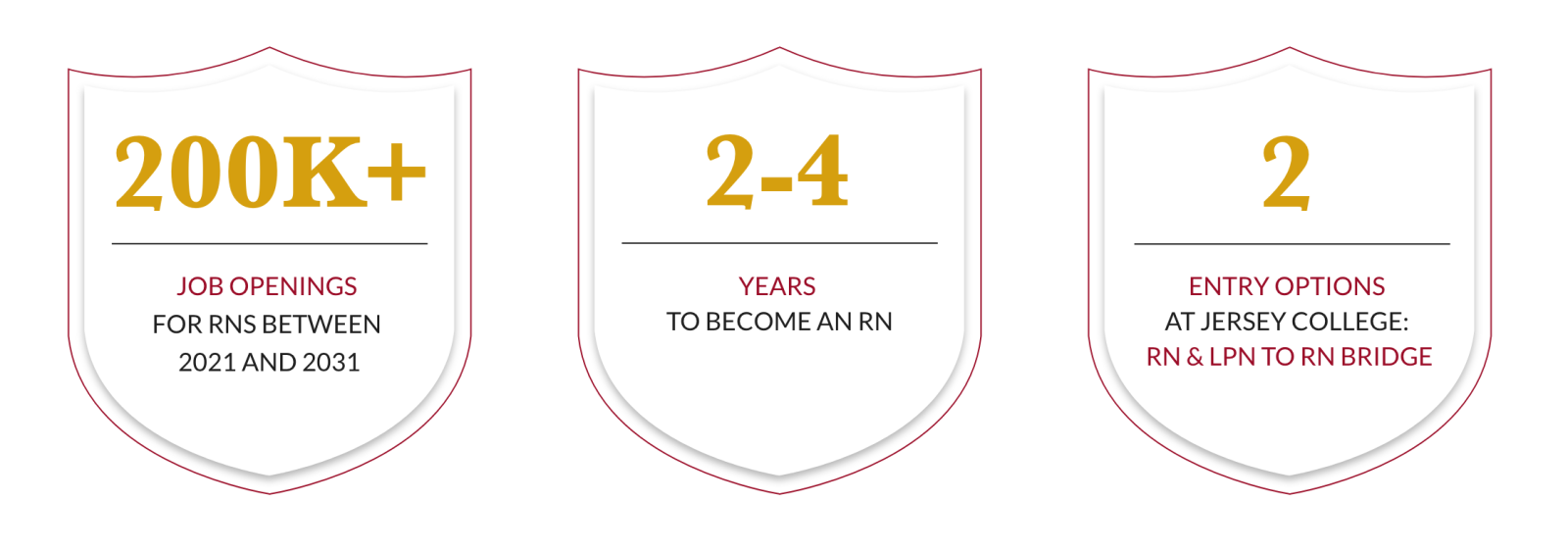
How to Transition Your Career from Paramedic to Registered Nurse
There is a wide range of RN programs for EMTs or paramedics. Some of these are bridge programs specifically designed for those making the transition. These typically remove a small amount of time from a full, generic RN program.
You also have a choice of which degree you want to earn. Earning an ADN, like the program at Jersey College, will typically take about two years, while a BSN program will typically take four.
All programs, whether bridge, ADN, or BSN, will cover topics like:
- Nursing theory
- Planning for patient care
- Mental health nursing
- Pharmacology
RN Program Curriculum
A typical RN curriculum includes core courses like microbiology, sociology, and nutrition. It also includes nursing courses that take you through specialties like psychiatric nursing. Additionally, you may take classes on leadership and teamwork.
Learn more about the Jersey College RN curriculum, or see what the course load might look like for you by reviewing our Sample Education Plan.

FREE Essential Guide to Nursing School: Get Accepted, Survive, and Thrive!
Benefits of Becoming an RN
There are several reasons that would motivate a paramedic to become a registered nurse. Some of the main benefits of transitioning into an RN role include:
- Wider range of job opportunities and work environments
- Better pay
- More career advancement and specialization opportunities
- More patient contact
Responsibilities of an RN
If you're thinking of a move from paramedic to RN, it's important to have an understanding of how your day-to-day job duties may change. If being an EMT is like a series of sprints, being an RN is more like a marathon.
Some of your responsibilities will include:
- Developing care plans for patients and keeping records of their progress
- Serving as an intermediary between doctors and patients
- Counseling and comforting both patients and families
- Ensuring patient comfort and pain relief
Do RNs and Paramedics Share Job Responsibilities?
While you'll find that many of your skills transfer as you transition from paramedic to RN, the day-to-day responsibilities can be quite different.
As an EMT, your goal is to stabilize the patient and get them to the hospital as quickly as possible. RNs, on the other hand, are responsible for keeping patients safe and comfortable for their whole stay. They also support doctors by administering medications and keeping detailed records of patient conditions.
| Responsibility | Paramedic | RN |
|---|---|---|
| Intake | Quick assessment to stabilize patient |
Longer assessment that includes developing a care plan and keeping track of data |
| Patient Care | CPR and other life-saving procedures |
Ensuring patients are safe, comfortable, and in minimal pain |
| Administering Medication | Only emergency medications | All needed patient medications |
| Emergency Care | Stabilizing patient for transport | Taking quick action if patient deteriorates |
| Record Keeping |
Recording vitals to give to hospital team |
Recording vitals, pain assessments, symptoms and more. Keeping records that can be accessed by other nurses and doctors |

Sign up to get new articles in your inbox and stay updated on our nursing programs.
Career Outlook
With employment in healthcare set to grow more quickly than other occupations, the outlook for most medical professions is very good. RNs are no exception, and the profession is set to grow by 6% over the next decade.
Specializations
Once you have your RN license, you can work in a variety of environments. Roles you can hold include:
- Home health care nurse
- Trauma nurse
- Medical-surgical nurse
- ER nurse
- Operating room nurse
As you can see, RNs have a wider range of options than paramedics. Some of these roles, like ER nurse, have a lot of similarities with paramedic work. Others, like home health care nurse, are typically a bit slower paced and involve more relationship-building with patients.
Paramedic vs. Nurse: Salary Expectations
As of 2023, the median RN salary in the US is $86,070 a year. This is more than twice the $38,930 median salary for an EMT and about 40% more than the median salary of $53,180 for paramedics.
Making the paramedic to RN transition is a great way to boost your income potential. RNs with previous experience as an EMT or paramedic should also be sure to highlight this when applying for jobs. Your experience, skills, and demonstrated history of working in a fast-paced and demanding environment may give you a leg up in the applicant pool for certain positions that require related skills.
For more information on pay expectations, check out our nursing salary guide.
RN Programs at Jersey College
Jersey College offers RN programs at many of our campuses. These include:
Accreditations & Licenses
Jersey College is accredited by the Commission of the Council on Occupational Education.
Each campus is licensed, authorized, and/or approved by its respective state governing educational body, and the nursing programs are licensed, authorized, and/or approved by the respective State Board of Nursing.
For location-specific information, visit our accreditation and licensing page
Frequently Asked Questions
- Can I earn my RN degree online?
Yes and no. Some schools allow you to earn your associate's degree in nursing online, but you will still need to do in-person clinical hours in order to get licensed as an RN. That's why you may prefer an in-person program if you don't already have your license.
Jersey College offers popular evening nursing classes at some of our campuses. At this time, we do not offer an online option for our programs although certain campuses may offer general education courses in a hybrid format.
- How long does a registered nurse program last?
Most RN programs take about two years. It may take a little longer if you need to take evening classes or fit your program around an existing job.
Learn more about how long it takes to become a nurse.
Program length is subject to change and is determined based on a number of factors, including, but not limited to: (i) pace of completion, (ii) quantity of credits taken per term, (iii) repeats of coursework, and (iv) leaves.
- Can you become an RN as an EMT?
Absolutely. You will, however, still need to complete at least an associate's degree in nursing. You'll also have to sit for (and pass) the NCLEX-RN exam to be licensed.
- Can you become a paramedic as an RN?
Yes! Many people choose to keep their EMT or paramedic license in order to become a nurse paramedic. These roles are very important, especially in rural areas.
Depending on your state, there may be less stringent requirements to get an EMT license if you already have a nursing degree.
Find Your Campus
Based on the success of our programs, we have grown to serve communities in 7 states (and counting!). Find a campus near you to start your NurseLife.

FREE Essential Guide to Nursing School: Get Accepted, Survive, and Thrive!


